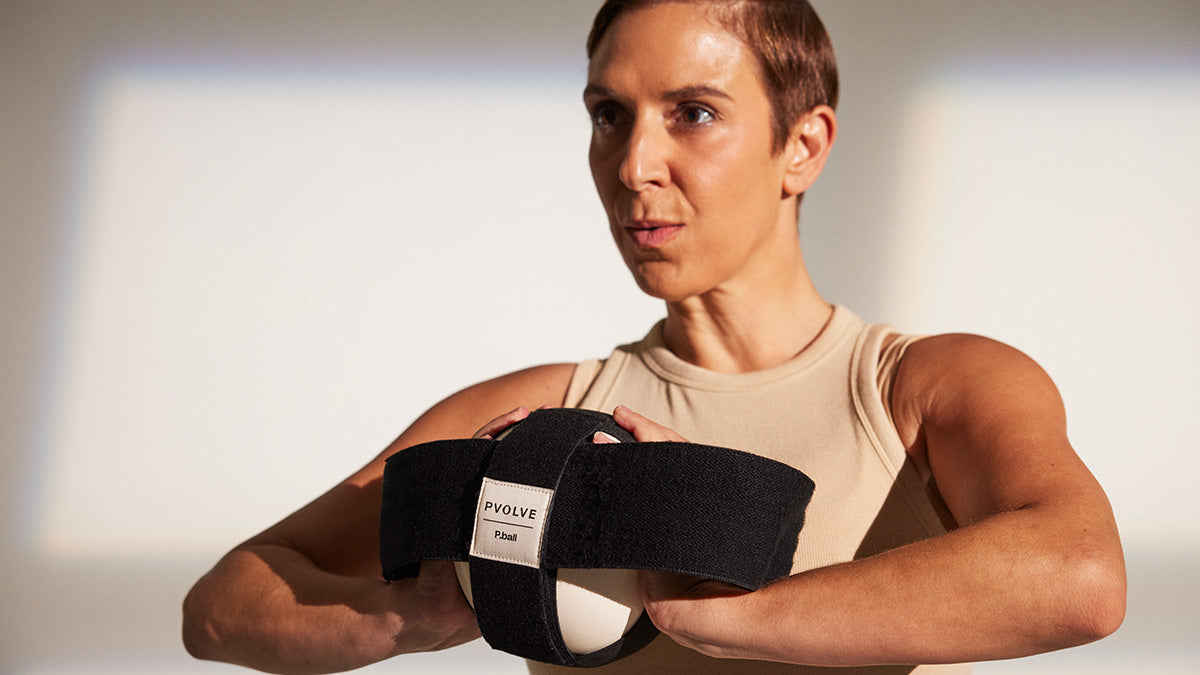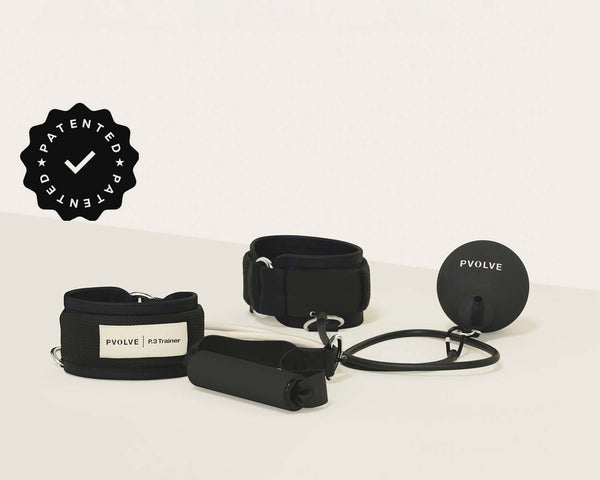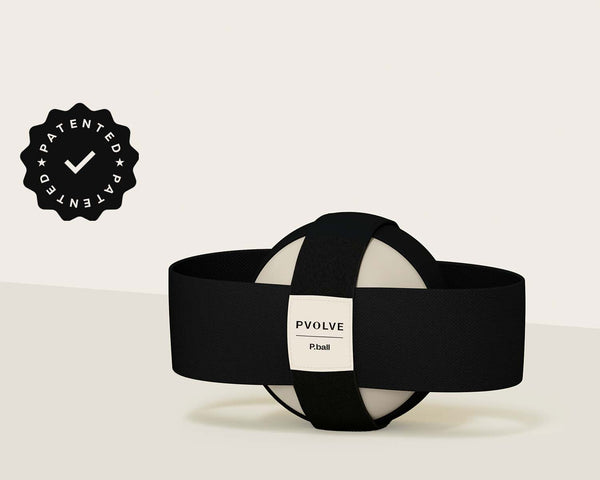What Pvolve’s New Healthy Aging Study Means for Menopausal Women
Milestone research shows that using Pvolve can improve strength, lean muscle mass, balance, and more in women over age 40.
For years, Pvolve members have known that our functional fitness-based Method tones, strengthens, and sculpts at any age—including pre-and post-menopause. And now a clinical study backs up those results.
The recent Healthy Aging Study, conducted by the University of Exeter, found that perimenopausal and menopausal women who consistently perform Pvolve workouts have increased lower body strength and muscle mass compared with those who follow standard physical activity guidelines. This study not only shines a light on the importance of lower-impact functional fitness on women’s health, but it also helps to fill a devastating gender gap in sport and exercise science research, since women are generally underrepresented in these studies.
Digging into the Research
Significant improvements in strength and mobility were seen in participants who followed the Pvolve method, compared to where they were at the beginning of the clinical study. On the other hand, no significant improvements were seen for participants who followed standard activity guidelines of 150 minutes per week of moderate cardio and strength training.
After 12 weeks, the women engaged3 with Pvolve showed considerable improvements in their fitness and health. These included:
- Boosted energy Study subjects who followed the Pvolve Method experienced impressive feel-good benefits, including a 23%8 improvement in fatigue and a 7.2% improvement in quality of life.
- Increase in strength Women naturally lose 3-5% of muscle mass per decade, starting at age 30, but Pvolve’s workouts are shown to help offset some of this loss. According to the study, women in the 12-week Pvolve program experienced a significant increase in lean muscle mass9 and improved their lower body strength by 19%5.
- Better balance and flexibility This increase in strength was associated with a 10%7 improvement in lower body balance and mobility and a 21%6 improvement in flexibility. Along with mobility and stability (which also improved for the Pvolve group), balance and flexibility are vital for helping to reduce the risk of falls later in life.
- Positive health outcomes Women in the Pvolve group showed a significant decrease in cholesterol levels and triglycerides (a type of fat found in the blood10). Healthy levels of cholesterol and triglycerides are linked to a lowered risk of stroke and heart disease—the number one killer of women.
*Compared with the control group
Menopause’s Effect on Fitness Level
We know about the hot flashes and mood swings, but for many women, the effect that menopause has on their fitness level can still take them by surprise. Even for those who have been dedicated exercise enthusiasts for most of their life, the menopause transition tends to come with a sharp plummet in strength and muscle.
You can blame your hormones. When estrogen levels drop during menopause, visceral fat (the type of fat that shows up around the belly) increases while muscle mass, strength, and bone mass density take a dive. And the average weight-loss focussed workout program—heavy on cardio and high-impact moves—doesn’t always help women regain their former lean muscle and strength.
Instead, women should look for a workout that builds strength and lean muscle. As shown by the Healthy Aging Study, Pvolve checks those boxes. The functional fitness-based Method focuses on low-impact moves that deeply engage all of your muscles to strengthen while also increasing mobility—all while being gentle on the body.
Why Muscle Strength Matters After Menopause
Focussing on strength is important at any age, but many experts argue that it’s a necessity once you reach midlife. “Aging, and in particular menopause, accelerates muscle loss, weakness, and immobility, and, ultimately, increases the risk of falls and fractures,” says Francis Stephens, PhD, lead study author and professor of sports and health sciences at University of Exeter. “These declines lead to an inability to perform everyday tasks, resulting in a loss of independence and quality of life.”
Women may spend up to half of their lives post-menopause, so committing to a workout routine that helps increase strength, balance, and flexibility could benefit you for decades to come.
The Importance of the Healthy Aging Study
At Pvolve, we’re thrilled by the results of the Healthy Aging Study. It shows that our Method is incredibly effective for women in midlife. But more importantly, we’re proud that this study exists in the first place—and thankful for the support from Pvolve members that enabled us fund this research.
Despite making up about 50% of the population, women have historically been underrepresented in all medical research, including exercise science studies. One 2021 study in Women in Sport and Physical Activity Journal found that while 31% of sport and exercise science publications included only males, just 6%1 of publications included only females. This can have potentially dangerous consequences. “Unfortunately, all too often, research findings from exercise studies involving [just] men have also applied to women,” says Stephens.
By investing in women’s health research, we’re guaranteeing a better understanding of the effect that female sex hormones have on exercise performance, particularly for those ages 40+. This is especially important considering the population of older adults is increasing (in 2020, about 1 in 6 people in the United States were age 65 and over.)
And as leaders in the fitness space, Pvolve is dedicated to helping everyone live all of their years in good health.
Further reading
How women can improve fitness and health during their midlife years, Your Top Healthy Aging Questions, Answered by Dr. Francis Stephens.
To explore the classes check out the University of Exeter x Pvolve Healthy Aging Calendar
To learn more about this milestone research and how women can improve fitness and health during their midlife years, please visit: https://www.pvolve.com/pages/method
About Pvolve
Pvolve is an omnichannel fitness company with a science-led method that pairs low-impact, functional movement with patented resistance equipment to sculpt, strengthen, and restore the body while enhancing mobility and flexibility. After being introduced to functional fitness in 2017, founder Rachel Katzman was determined to help others experience an approach that respects the body's holistic needs while making you look and feel great. The Pvolve Method is supported by a Clinical Advisory Board of doctors, as well as highly credentialed trainers, to offer effective workouts that help you break a sweat, not your body. In June 2023, world-renowned actress, producer, and director, Jennifer Aniston, officially partnered with Pvolve after falling in love with the method as a member. Through its hybrid fitness model, Pvolve can be experienced through a streaming membership that offers over 1,300 on-demand classes, a two-way, live virtual studio, and targeted series, all available via the web and mobile apps. Additionally, Pvolve has physical studio locations in New York, Chicago, Los Angeles, and franchises across the US and Canada, with more than 35 locations in development. For more information, please visit https://www.pvolve.com/, https://pvolvefranchise.com/.
About University of Exeter
The University of Exeter combines world-class research with excellent student satisfaction, from our campuses in the South West of England, in Exeter and Cornwall. We are one of the very few universities to be both a member of the Russell Group and have a Gold award from the Teaching Excellence Framework (TEF), evidence of our established international reputation for excellence in both teaching and research. Our success is built on a strong partnership with our students and a clear focus on high performance.Foot notes:
1 - Souce: Cowley, Emma & Olenick, Alyssa & Mcnulty, Kelly & Ross, Emma. (2021). “x. 29. 1-6. 10.1123/wspaj.2021-0028.
2 - Source: Austad SN. Why women live longer than men: sex differences in longevity. Gend Med. 2006;3(2):79–92.
3 - The 12-week clinical trial conducted by the University of Exeter and Pvolve included 72 women ages 40-60 years old, comparing 4 Pvolve workouts per week of 30-55 minutes in length to standard physical activity guidelines of 150 minutes per week.
4 - Subjects in the control group followed physical activity guidelines of 150 minutes per week consistent with guidelines and recommendations from the American College of Sports Medicine (ACSM), Centers for Disease Control and Prevention (CDC), American Diabetes Association (ADA), and American Heart Association (AHA).
5 - Preliminary results from a 12-week clinical trial of 72 women ages 40-60 show a significant increase in hip flexion strength and an increase in hip abduction strength for study participants following Pvolve method 4 times per week, 30-55 minutes in length per session vs. standard physical activity guidelines of 150 minutes per week. Results are presented from baseline with no changes observed in the control group.
6 - Preliminary results from a 12-week clinical trial of 72 women ages 40-60 show a significant increase in “sit and reach” mobility, indicating an overall increase in hip, lower, and upper body flexibility for study participants following Pvolve method 4 times per week, 30-55 minutes in length per session vs. standard physical activity guidelines of 150 minutes per week. Results are presented from baseline with no changes observed in the control group.
7 - Preliminary results from a 12-week clinical trial of 72 women ages 40-60 show a significant increase in lateral reach and medial reach, and an increase in anterior reach and combined reach, resulting in a total increase in hip and lower body mobility and stability for study participants following Pvolve method 4 times per week, 30-55 minutes in length per session vs. standard physical activity guidelines of 150 minutes per week. Results are presented from baseline with no changes observed in the control group.
8 - Preliminary results from a survey conducted as part of a 12-week clinical trial of 72 women ages 40-60 show a significant increase in quality of life and energy/fatigue for study participants following Pvolve method 4 times per week, 30-55 minutes in length per session vs. standard physical activity guidelines of 150 minutes per week. Results are presented from baseline with no changes observed in the control group.
9 - Preliminary results from a 12-week clinical trial of 72 women ages 40-60 show a significant increase in lean mass, measured by a body composition (DEXA) scan, for study participants following Pvolve method 4 times per week, 30-55 minutes in length per session vs. standard physical activity guidelines of 150 minutes per week. Results are presented from baseline with no changes observed in the control group.
10 - Preliminary results from a 12-week clinical trial of 72 women ages 40-60 show significant decrease in cholesterol levels and triglycerides for perimenopausal study participants specifically, measured via bloodwork, following Pvolve method 4 times per week, 30-55 minutes in length per session vs.standard physical activity guidelines of 150 minutes per week. Results are presented from baseline with no changes observed in the control group.






































